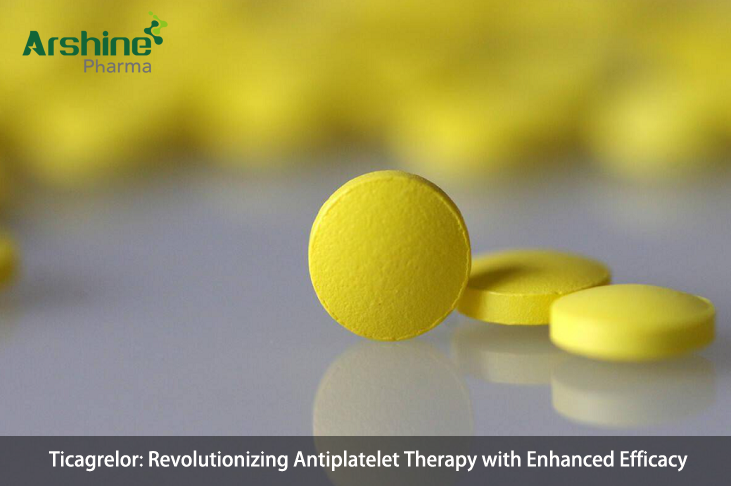
Introduction
In the realm of cardiovascular medicine, the search for novel therapeutic agents that can effectively combat the intricate pathophysiology of platelet aggregation has been unceasing. Amid this quest, ticagrelor, a potent antiplatelet agent, has emerged as a groundbreaking solution. Known for its unique mechanism of action, ticagrelor has rapidly gained recognition for its superior efficacy compared to conventional antiplatelet medications. This article delves into the utilization and efficacy of ticagrelor, exploring its mechanism of action, clinical applications, and the potential transformative impact it holds on patient care.
The Mechanism Unveiled
Ticagrelor operates through a mechanism distinct from that of conventional antiplatelet drugs, making it a standout contender in the arsenal against cardiovascular diseases. As a reversible antagonist of the P2Y12 receptor on platelets, ticagrelor blocks the adenosine diphosphate (ADP) signaling pathway, thereby inhibiting platelet activation and aggregation. This mechanism diverges from the irreversible action of clopidogrel and prasugrel, two well-known P2Y12 receptor inhibitors. Unlike its counterparts, ticagrelor's reversible binding and rapid onset of action grant clinicians greater control over its effects, offering a pivotal advantage in emergent situations where immediate platelet inhibition is crucial.
Enhanced Efficacy in Clinical Applications
Ticagrelor's enhanced efficacy is particularly evident in its use in acute coronary syndrome (ACS), a constellation of cardiovascular conditions characterized by ruptured atherosclerotic plaques and subsequent thrombosis. Studies have consistently demonstrated that ticagrelor, in combination with aspirin, outperforms other antiplatelet regimens in ACS patients, substantially reducing the risk of recurrent myocardial infarction, stroke, and cardiovascular death. The reversible nature of ticagrelor's binding ensures that its effects are rapidly reversible upon cessation, mitigating concerns associated with irreversible platelet inhibition seen with other agents.
Beyond ACS, ticagrelor's utility extends to percutaneous coronary intervention (PCI), a procedure aimed at restoring blood flow through blocked coronary arteries. The prompt onset and offset of ticagrelor's action provide an advantage in PCI scenarios, where quick intervention and rapid recovery of platelet function post-procedure are essential. Additionally, ticagrelor's efficacy has been evaluated in secondary prevention among patients with a history of myocardial infarction. The PEGASUS-TIMI 54 trial showcased a reduced risk of major adverse cardiovascular events, reinforcing ticagrelor's potential in improving long-term outcomes.
Commentary on Transformative Impact
Ticagrelor's distinctive mechanism of action and robust clinical efficacy mark a transformative moment in antiplatelet therapy. Its reversible inhibition of the P2Y12 receptor not only ensures rapid platelet inhibition but also offers a safety advantage by allowing platelet function to recover more swiftly upon drug discontinuation. This aspect is particularly crucial in situations requiring surgical interventions or in patients at risk of bleeding complications. The versatility of ticagrelor across different cardiovascular scenarios enhances its role as a potent therapeutic agent in modern cardiology practice.
While ticagrelor's efficacy is undeniable, certain considerations warrant attention. The medication's dosing regimen, twice daily, may pose adherence challenges for some patients, raising concerns about maintaining optimal platelet inhibition. Additionally, cost considerations and access to the drug may impact its utilization, especially in resource-constrained healthcare settings. Ongoing research into the interplay between ticagrelor and other cardiovascular medications is essential to ensure compatibility and safety in combination therapy.
Conclusion
Ticagrelor's advent has revolutionized the landscape of antiplatelet therapy, ushering in a new era of enhanced efficacy and safety. Its reversible binding to the P2Y12 receptor, coupled with rapid onset and offset of action, positions it as a potent player in managing acute coronary syndromes, percutaneous coronary interventions, and secondary prevention. Ticagrelor's unique profile not only challenges the conventional approaches of irreversible platelet inhibition but also paves the way for more personalized and precise cardiovascular care. As research continues to elucidate its potential in diverse patient populations and scenarios, ticagrelor's impact on patient outcomes and the field of cardiovascular medicine at large is bound to remain a subject of intense exploration and discussion.
